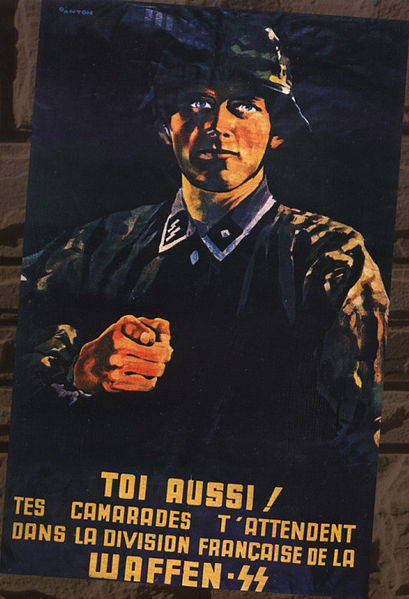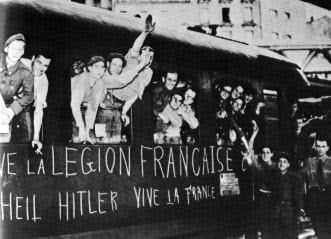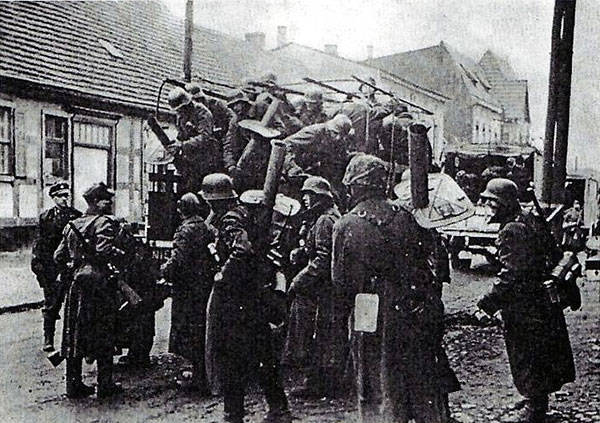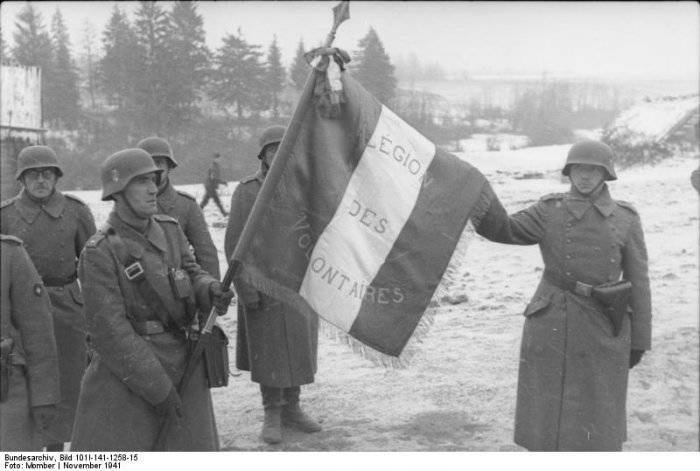Unknown France: the French against the USSR during the Great Patriotic War
 In the USSR and the Russian Federation, it was assumed that the French people, France were occupied and participated in the war on the side of the anti-Hitler coalition, were our allies. But this is not the whole truth - indeed, some French went underground, French resistance, some participated in battles on the Eastern Front on the side of the USSR in the French Fighter Aviation Regiment (1 and Normandie-Niemen).
In the USSR and the Russian Federation, it was assumed that the French people, France were occupied and participated in the war on the side of the anti-Hitler coalition, were our allies. But this is not the whole truth - indeed, some French went underground, French resistance, some participated in battles on the Eastern Front on the side of the USSR in the French Fighter Aviation Regiment (1 and Normandie-Niemen).But even more French quietly accepted the power of Hitler and even supported his plans, including with weapons in the hands of - the French crossed arms in North Africa with the Anglo-American forces, participated in the battles on the Eastern Front in the ranks of the Armed Forces of the Third Reich. In London and Washington even were going to rank France as the territories which were subject to occupation after the Second World War, which were located in the same camp with Germany. Only the firm position of I. Stalin saved France from the occupation regime and, at his insistence, was included in the anti-Hitler camp. Stalin insisted on the allocation of a special French occupation zone in Germany to France. To the credit of Charles de Gaulle, he remembered it after the death of the Soviet leader, retaining respect for him after the "de-Stalinization" arranged by Khrushchev.
After the occupation of Northern France in the 1940 year and the creation of the Vichy regime in the south of the country, until May 1945 many Frenchmen volunteered under the banner of dozens of units and formations of the armed forces and auxiliary organizations of the Third Reich. There were tens of thousands of such French volunteers, and as a result the citizens of France constituted the largest Western European people in numbers, fighting on the side of Nazi Germany in World War II.
On the day of the invasion of Hitler's forces in the USSR - 22 June 1941, the leader of one of the French Nazi groups PPF - Parti Populaire Francais ("National People's Party") Jacques Doriot put forward the idea of creating a Legion of French volunteers in order to take part in the war against the Soviet Union . Otto Abetz, the Reich Ambassador in France, reported this to Berlin and on July 5 received a telegram in which Ribbentrop approved this idea. Already on July 6, the Reich embassy in Paris hosted the 1-I meeting of the French and German representatives, July 7 - the 2-I meeting - in Wehrmacht headquarters in France. Representatives of all the French Nazi and collaborationist groups were present - Marcel Bucard Marcel (“French Movement”), Jacques Doriot (“National People’s Party”), Eugene Deloncelet (“The Social Revolutionary Movement”), Pierre Clementi (“French Party of National Unity”) and Pierre Constantini (“French League"), then the Central Committee of the Legion of French Volunteers (LVF) and the recruiting center were created. It is interesting that it was located in the building where the office of the Soviet tourist agent was located Intourist. The slogan of the Anti-Bolshevik Crusade was widely used.
During the time period from July 1941 to June 1944, 13 thousand people applied to join the Legion of French Volunteers, but not more than half of the volunteers accepted the Legion: the German doctors eliminated the rest. The LVF included not only volunteers, but also those former French prisoners of war who preferred war on the Eastern Front to camps and forced labor. The first batch of Frenchmen arrived in Poland in September 1941 of the year - from 2,5 thousands of people formed a double-battalion French Infantry Regiment 638 under the command of Colonel Roger Labon. The French wore a Wehrmacht uniform with a blue-white-red patch on the right sleeve. The banner of the regiment was also tricolor, orders were given in French. 5 November 1941, Marshal Petain, sent a message to the French volunteers: "Before you go into battle, I’m glad to know that you don’t forget - you own a part of our military honor." The battalions left Debu 28 and 30 on October 1941, the first battalion was commanded by Captain Leclerc, then Commander de Planard, and the second battalion was Commander Girardot. The battalions arrived in Smolensk, from where on November 6 on foot went to the capital of the USSR.
The French suffered their first losses before the fighting - their uniforms did not meet the weather conditions, and as a result, 400 people turned out to be sick and missing before the front line. Another interesting fact: the French entered the battle on the memorial of their ancestors Borodino field - they were ordered to attack the 32 Infantry Division of the Red Army. After a week of battles, the 1 th battalion suffered heavy casualties in battle, the 2 th suffered heavy losses from frostbite. December 6-9 The French 638 regiment was completely relegated. The regiment lost 65 people killed, 120 - wounded and more 300 people sick and frostbite. The Germans made disappointing conclusions for the Legion: “People showed, on the whole, a good fighting spirit, but their level of combat training is low. The sergeant staff, in general, is not bad, but does not show activity, since the senior staff does not show efficiency. The officers are not capable of much and were clearly recruited according to a purely political principle. ” And they brought a disappointing result: “The Legion is not capable. Improvement can only be achieved through renewal of officers and accelerated training. ”
The Legion was withdrawn from the Eastern Front, most of it, including officers, was sent to France. By the year 1942 managed to create a more monolithic and combat-ready unit, it already had three battalions of 900 people. The Legion began to be used in the fight against partisans in Ukraine and Belarus. In 1943, he was headed by Colonel Edgar Puo, a former officer of the Foreign Legion, who received the rank of brigadier general, for his successes in the counter-guerrilla struggle, he was awarded two Iron Crosses.
 In 1944, the Legion again entered the battle at the front, in Belorussia, after which its remnants were poured into the French 8 of the SS assault brigade. This team was mainly formed from volunteers of the French Collaborationist Militia of students; in total, about 3 thousand people were recruited.
In 1944, the Legion again entered the battle at the front, in Belorussia, after which its remnants were poured into the French 8 of the SS assault brigade. This team was mainly formed from volunteers of the French Collaborationist Militia of students; in total, about 3 thousand people were recruited. The most famous unit of the French volunteers was the 33-I SS Grenadier Brigade (then the division) "Charlemagne" - named after "Charlemagne" (Fr. Charle Magne). Its formation began in the 1944 year - two regiments were created (57 and 58), the core of the 57 regiment was made up of veterans of the French assault brigade, and 58 of the veterans of the Legion. At the beginning of 1945, Himmler promised the French commanders that some would not be sent to the Western Front, where they could encounter compatriots, they were promised to leave the French military priests, the national banner, and to preserve the independence of France after the war. In February, the subdivision 1945 was reorganized into a division, although the number could not be brought to the regular one - there were only 7,3 thousand people in it.
At the end of February 1945, the command of the Wehrmacht threw a division to plug a gap in the area of the city of Charne in Poland, she entered the battle on February 25 with parts of the Belarusian Front 1. On March 4, the remnants of the division were transferred to Berlin, where they were in May 1945 of the year and ended their combat path. The French took part in the most important operation of the war - the defense of Berlin. At the same time, according to the recollections of the Germans, they fought to the last, defending the Reich Chancellery together with volunteers from the Scandinavian countries from the SS division Nordland. After the fighting in Berlin, only a few dozen Frenchmen survived, almost all were prosecuted, receiving the death penalty or prison sentence in the “reward” for serving France - as they understood it.
The French were also in other units of the German Armed Forces, making a feasible contribution to the "common cause." So, in French Brittany was created the so-called. Perrault's group, 80 people were recruited, from March 1944 she participated in the struggle against the French partisans. After the liberation of France, part went with the Germans to Germany. In the 21st tank Wehrmacht divisions, where there were French trucks and armored vehicles, in the 2nd maintenance company, there were 230 French volunteers. In the Brandenburg division in 1943, the 8th company of the 3rd regiment was formed from the French, it was located at the foot of the Pyrenees in southwestern France. Participated in the anti-partisan struggle. Operating in southern France, the 8th company mimicked the French Resistance, using captured radio stations, and was able to intercept many transports with weapons and other military materials. With its help, many underground workers were able to identify and arrest. The company also participated in battles against the resistance forces, in the so-called. The battle for Vercors. In this battle, in June-July 1944, significant forces of the Germans and French collaborators (more than 10 thousand people) were able to suppress the large performance of the French Resistance on the isolated Vercors mountain plateau, which began after de Gaulle's call to support the Allied landing in Normandy. Several hundred partisans were destroyed.
A significant number of Frenchmen also served in the Navy of the Reich (Kriegsmarine) - moreover, conscription posts were opened only in 1943, when there was no talk of a quick victory over the USSR. The French were enrolled in German units and wore German military uniforms without any special additional stripes. In February 1944, in the French ports of Brest, Cherbourg, Lorient, Toulon in German service there were: about a hundred officers, 3 thousand non-commissioned officers, 160 engineers, almost 700 technicians and 25 thousand civilians. About one and a half thousand of them in 1944 joined the Charlemagne Division. The Todt organization, which in France built fortifications and bases for underwater fleetconsisted of 52 thousand French and 170 thousand North Africans. Of these, 2,5 thousand served in the armed guard of those facilities that this organization cost. Some were transferred to the construction of facilities in Norway, several hundred then joined the Charlemagne Division. Up to 500 Frenchmen served in the Speer legion, which carried out construction functions in France, then was engaged in supplying the Reich Air Force as part of the NSKK (Nationalsocialistische Kraftfahrkorps) Motorgruppe Luftwaffe (this is the Luftwaffe division of Germany engaged in material support). In addition, another 2500 French served at NSKK.
There are no exact figures on how many Frenchmen fought against the USSR on the Eastern Front, there is only data on the captured French - 23 was in the Soviet captivity 136 people were French citizens. Summing up, we can say that France took an active part in the war against the Soviet Union, French citizens deliberately helped Build his "new world order" to Hitler. And even in the post-war period, the surviving French volunteers did not show regret in this, believing that they participated in the "crusade" against Bolshevism.
Therefore, remembering de Gaulle and the French pilots of the Normandy-Niemen regiment, we should also know about the French in the Wehrmacht, the French Legion, which repeated the fate of Napoleon’s “Great Army”, thousands of French who fought in various units of the Reich forces against the Anti-Hitler army coalition.

Sources of:
Mukhin Y. Crusade to the East. M., 2006.
Russia and the USSR in the wars of the XX century. Ed. G. Krivosheev. M., 2001.
http://militera.lib.ru/memo/german/sajer/index.html
http://www.iremember.ru/dopolnitelnie-materiali/frantsuzskie-dobrovoltsi-v-voruzhennikh-silakh-natsistskoy-germanii.html

Information